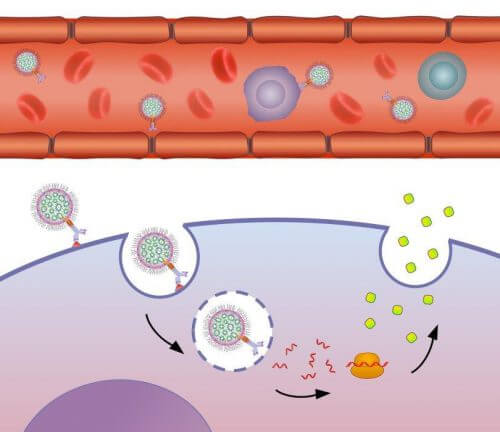The researchers, led by Prof. Dan Farr from Tel Aviv University, focused on chronic inflammatory bowel diseases, and developed a targeted nanometer carrier that carries to the diseased cells genetic material (mRNA) that causes the production of anti-inflammatory proteins. According to the researchers, the platform will also be effective in a series of serious diseases such as: Cancer, chronic inflammation, rare genetic diseases and more. Prof. Parr: We hope that within a few years it will also be available for the treatment of humans." The article is published today (Sunday) in the journal Nature Communications

Researchers in the laboratory of Prof. Dan Parr, head of the Cancer Biology Research Center at Tel Aviv University, succeeded in developing a platform for launching genetic materials that encourage the production of specific proteins that fight the diseased target cells.
The innovative platform, which is suitable for a wide range of diseases (including cancer, chronic inflammations and rare genetic diseases), enables precise genetic therapy in the diseased cells, without affecting healthy cells, or in other words, without side effects - which can sometimes cause more damage than the disease itself.
The groundbreaking research, which focused on chronic autoimmune intestinal inflammations, such as Crohn's and colitis, was carried out under the leadership of doctoral student Nofer Viega, and with the assistance of other researchers in Prof. Parr's laboratory. The article is published today (Monday) in the journal Nature Communications.
"Gene therapy is an innovative medical technology that uses genetic material to stimulate the body's production of proteins that fight the disease, or alternatively, to suppress the production of proteins that support it," explains Nofer Viega. "The main challenge, which has not been answered to date, is to bring the genetic material precisely and specifically - exclusively to the diseased target cells, since, if it also reaches healthy cells in the environment, it
May cause serious side effects. In our laboratory, we have been engaged for some time in the development of a new and very specific platform, which will provide an answer to the problem."

The antibodies were used as navigators to the target
For the purpose of their work, the researchers used mouse models with chronic autoimmune intestinal diseases, which are caused by increased inflammatory activity of cells in the immune system known as Ly6c. In order to moderate and adjust the activity of the immune system cells that have gone out of control, the researchers sought to send them genetic material of the mRNA type (messenger RNA), which would stimulate in them the production of an anti-inflammatory protein called interleukin 10 (IL10).
In order to precisely launch mRNA molecules encoding IL10, so that they reach specifically Ly6c cells only, and exert their action on them, the researchers used innovative carriers: the appropriate mRNA molecule is packaged inside nanometer particles based on fat molecules, which are linked to Ly6c-specific antibodies, which target the target with great precision .
Nofer Veiga explains: "The great advantage of antibodies as navigators for the tiny carriers is their high specificity. An antibody is a protein produced by the immune system in order to recognize one specific molecule, and only to which it targets. In our system, the antibodies are attached to the cargo-carrying particles using an intermediary protein that we developed in a previous study." As part of the new study, the tiny carriers were injected into the bodies of the sick mice, and the results were promising: the severe symptoms of the inflammatory bowel diseases were significantly reduced.
"The platform we developed is suitable for gene therapy of a very large variety of diseases - from cancer to inflammatory and autoimmune diseases and rare genetic diseases - and thus its importance," Prof. Parr concludes. "With it, any genetic material can be sent to any cell in the body, according to our choice, and in this way inhibit or encourage the production of selected proteins that affect the course of the disease. In fact, the current study is a follow-up study to previous works, in which we sent genetic material of the siRNA (silencing RNA) type to the diseased cells, which silences the expressions of genes that support the disease. In a study published last summer, we successfully treated mice with lymph node cancer (lymphoma) in this way. Today we continue to research and develop the method and its uses, and hope that within a few years it will also be available for treating humans."

5 תגובות
Why do you have to wait so many years for wards full of patients who die every day.
What does this depend on the lack of budget and the lack of KA? Why don't the biologists in Israel hear what is going on and why the medicines are not promoted like the progress? It is time to wake up the audience. If something is missing, we will do everything to lift the gauntlet.
and help helpless people.
How and why does this carrier enter the cell after binding to the antigen on the cell?
It will be ready for use in 2045. When every child knew how to prepare medicine by himself at home.
Site doing holy work and saving lives! Champions, keep going!!
Thanks!